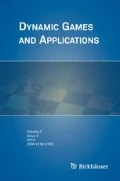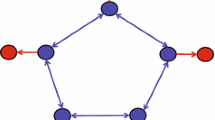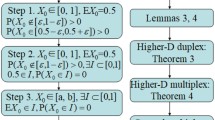Abstract
This paper provides a mean-field game theoretic model of the bandwagon effect in social networks. This effect can be observed whenever individuals tend to align their own opinions to a mainstream opinion. The contribution is threefold. First, we describe the opinion propagation as a mean-field game with local interactions. Second, we establish mean-field equilibrium strategies in the case where the mainstream opinion is constant. Such strategies are shown to have a threshold structure. Third, we extend the use of threshold strategies to the case of time-varying mainstream opinion and study the evolution of the macroscopic system.



Similar content being viewed by others
References
Acemoğlu D, Como G, Fagnani F, Ozdaglar A (2013) Opinion fluctuations and disagreement in social networks. Math Oper Res Feb 38:1–27
Achdou Y, Camilli F, Capuzzo Dolcetta I (2012) Mean field games: numerical methods for the planning problem. SIAM J Control Optim 50:77–109
Aeyels D, De Smet F (2008) A mathematical model for the dynamics of clustering. Phys D 237(19):2517–2530
Bagagiolo F, Bauso D (2014) Mean-field games and dynamic demand management in power grids. Dyn Games Appl 4:155–176
Banerjee AV (1992) A simple model of herd behavior. Quart J Econ 107(3):797–817
Bardi M (2012) Explicit solutions of some linear-quadratic mean field games. Netw Heterog Media 7:243–261
Başar T, Olsder GJ (1999) Dynamic noncooperative game theory. SIAM Series in Classics in Applied Mathematics, Philadelphia
Bauso D, Tembine H, Başar T (2012) Robust mean field games with application to production of an exhaustible resource. In: Proceedings of 7th IFAC symposium on robust control design, Aalborg
Bauso D, Zhu Q, Başar T (2012) Optimal mixed integer, compensation: decompositions and mean-field approximations. In: Proceedings of American control conference, Montreal, Montreal, Canada
Blondel VD, Hendrickx JM, Tsitsiklis JN (2010) Continuous-time average-preserving opinion dynamics with opinion-dependent communications. SIAM J Control Optim 48(8):5214–5240
Castellano C, Fortunato S, Loreto V (2009) Statistical physics of social dynamics. Rev Mod Phys 81:591–646
Colman A (2003) Oxford dictionary of psychology. Oxford University Press, New York
Di Mare A, Latora V (2007) Opinion formation models based on game theory. Int J Mod Phys C 18(09):1377–1395
Gomes DA, Saúde J (2014) Mean field games models—a brief survey. Dyn Games Appl 4(2):110–154
Gueant O, Lasry JM, Lions PL (2010) Mean field games and applications. Paris-Princeton Lectures. Springer, New York
Hegselmann R, Krause U (2002) Opinion dynamics and bounded confidence models, analysis, and simulations. J Artif Soc Social Simul 5(3):1–33
Huang MY, Caines PE, Malhamé RP (2003) Individual and mass behaviour in large population stochastic wireless power control problems: centralized and nash equilibrium solutions. In: IEEE conference on decision and control, HI, December, pp 98–103
Huang MY, Caines PE, Malhamé RP (2006) Large population stochastic dynamic games: closed loop Kean–Vlasov systems and the nash certainty equivalence principle. Commun Inf Syst 6(3):221–252
Huang MY, Caines PE, Malhamé RP (2007) Large population cost-coupled LQG problems with non-uniform players: individual-mass behaviour and decentralized \(\epsilon \)-Nash equilibria. IEEE Trans Autom Control 52(9):1560–1571
Krause U (2000) A discrete nonlinear and non-autonomous model of consensus formation. In: Elaydi S, Ladas G, Popenda J, Rakowski J (eds) Communications in difference equations. Gordon and Breach, Amsterdam, pp 227–236
Lachapelle A, Salomon J, Turinici G (2010) Computation of mean field equilibria in economics. Math Models Methods Appl Sci 20:1–22
Lasry J-M, Lions P-L (2007) Mean field games. Japan J Math 2:229–260
Pesenti R, Bauso D (2013) Mean field linear quadratic games with set up costs. Dyn Games Appl 3(1):89–104
Pluchino A, Latora V, Rapisarda A (2006) Compromise and synchronization in opinion dynamics. Euro Phys J B Condens Matter Complex Syst 50(1–2):169–176
Renardy M, Rogers RC (2004) An introduction to partial differential equations. Springer, New York
Stella L, Bagagiolo F, Bauso D, and Pesenti R (2013) Bandwagon effect in mean field games. In: Proceedings of IEEE 52nd annual conference on decision and control (CDC), Firenze, Italy, pp 1192–1197
Tembine H, Zhu Q, Başar T (2014) Risk-sensitive mean-field games. IEEE Trans Autom Control 59(4):835–850
Tembine H, Le Boudec JY, El Azouzi R, Altman E (2009) Mean field asymptotic of Markov decision evolutionary games. IEEE Gamenets
Author information
Authors and Affiliations
Corresponding author
Additional information
This work was supported by the 2012 “Research Fellow” Program of the Dipartimento di Matematica, Università di Trento.
Rights and permissions
About this article
Cite this article
Bagagiolo, F., Bauso, D. & Pesenti, R. Mean-Field Game Modeling the Bandwagon Effect with Activation Costs. Dyn Games Appl 6, 456–476 (2016). https://doi.org/10.1007/s13235-015-0167-x
Published:
Issue Date:
DOI: https://doi.org/10.1007/s13235-015-0167-x
Keywords
- Games with infinitely many players
- Bandwagon effect
- Activation costs
- Threshold policies
- Mean-field games
- Mode




